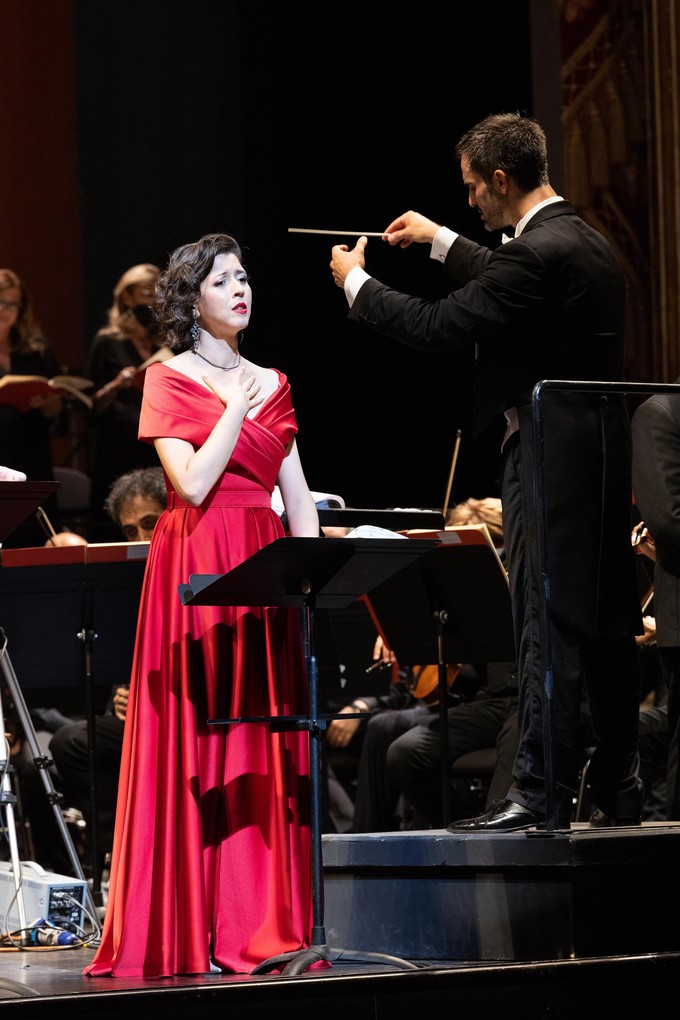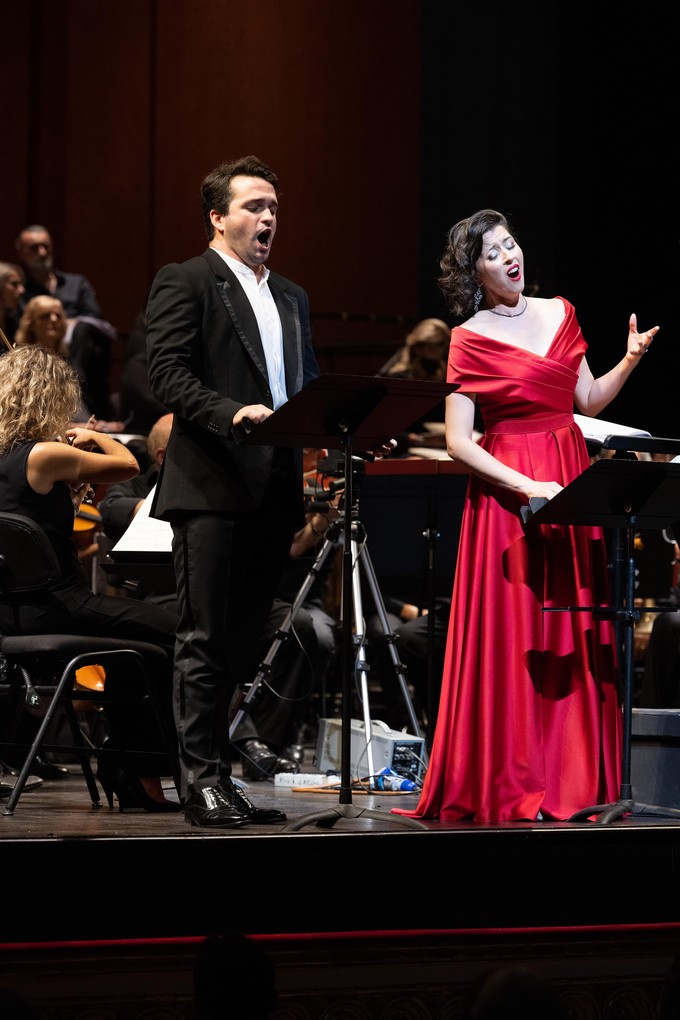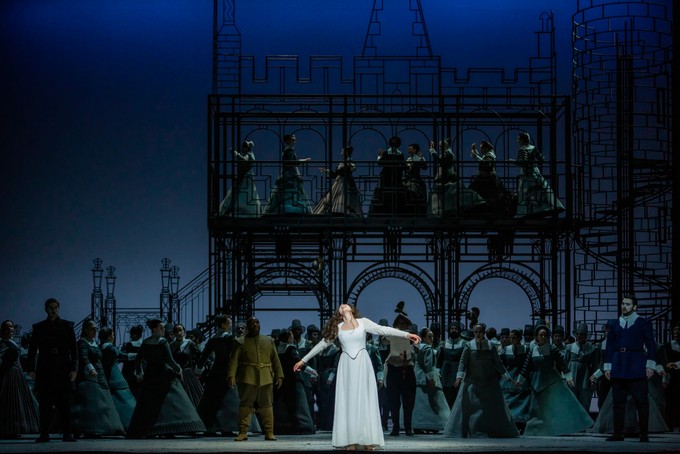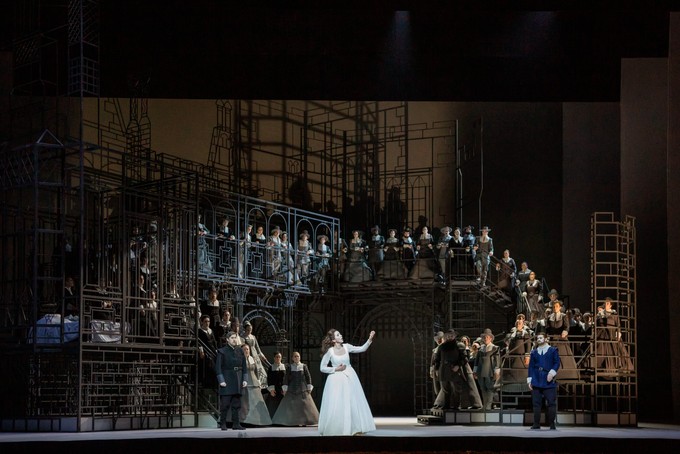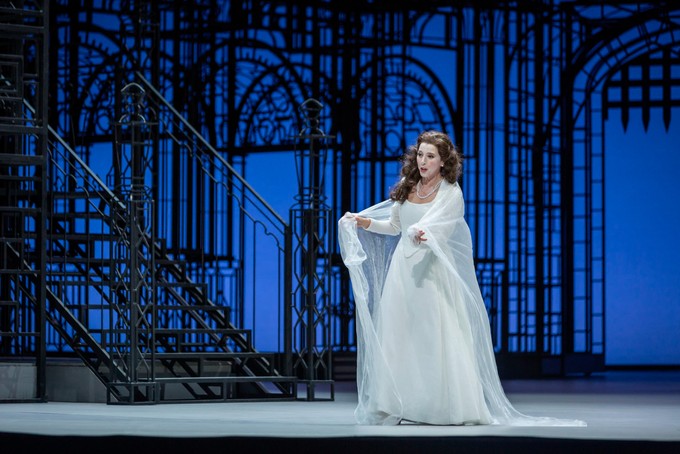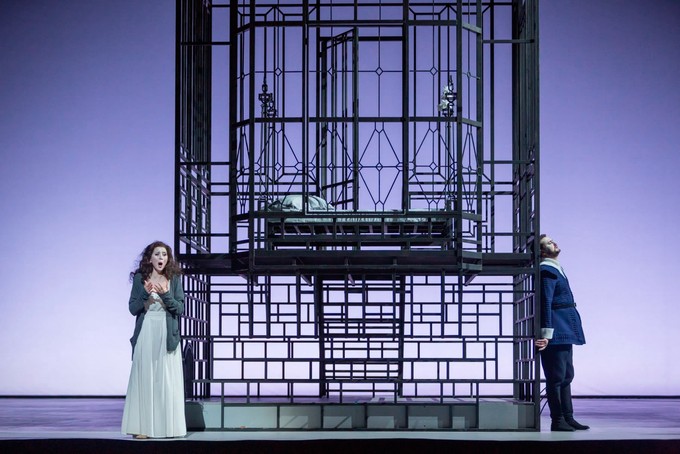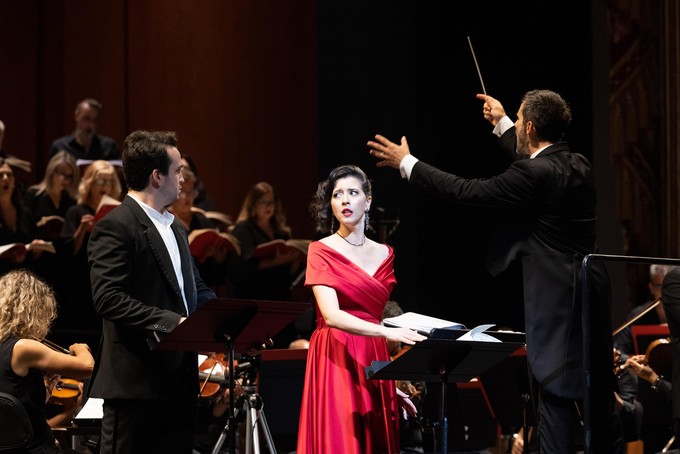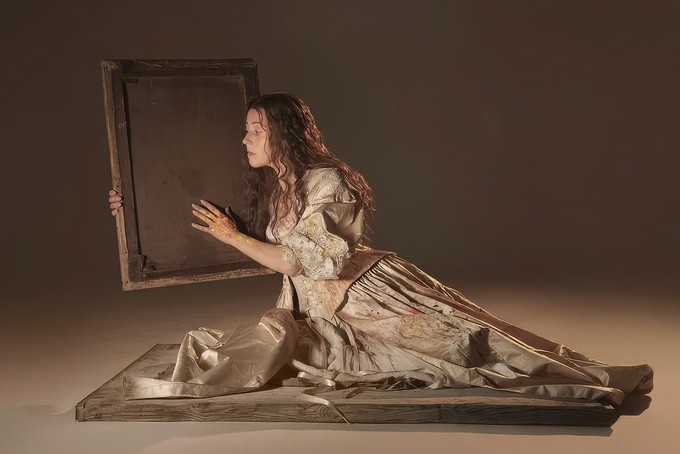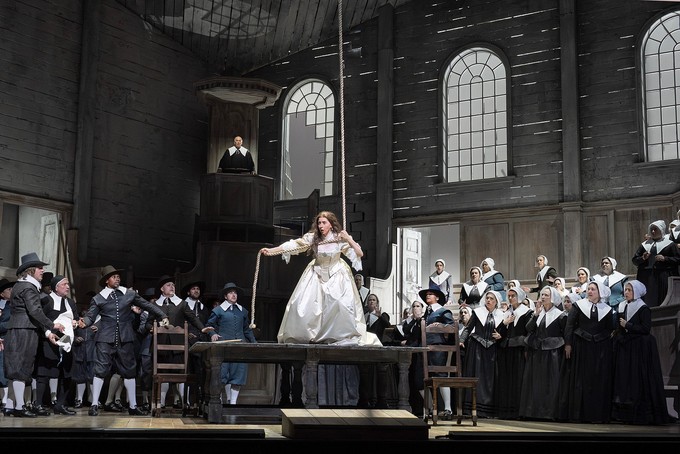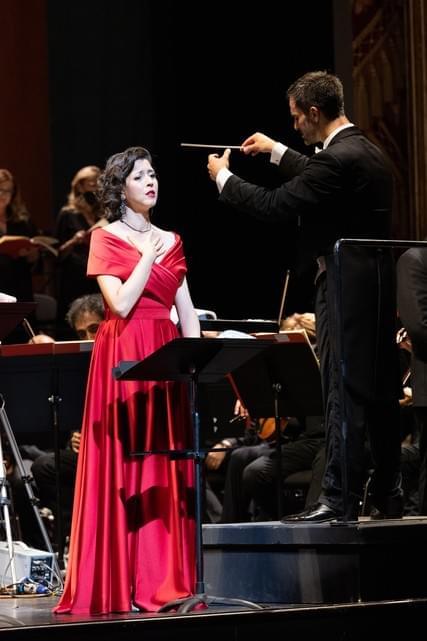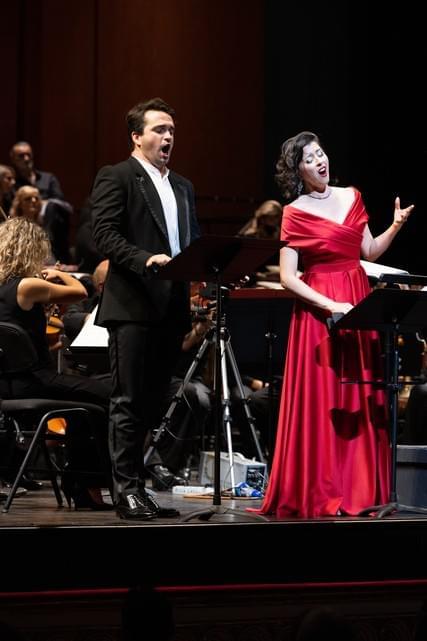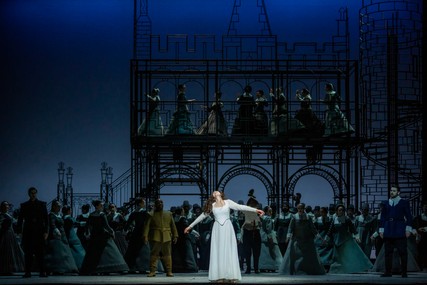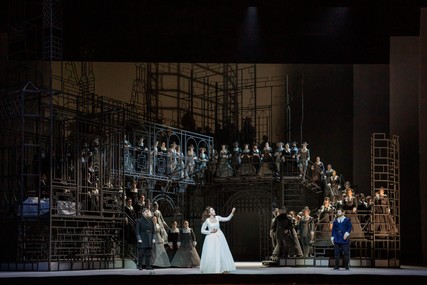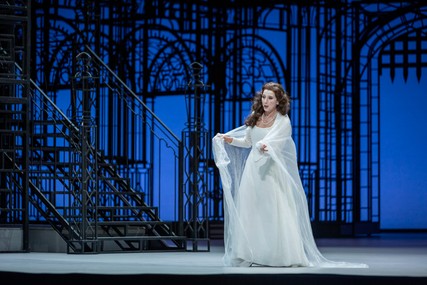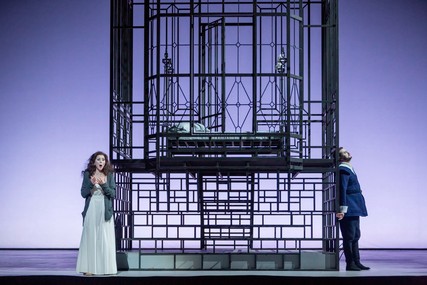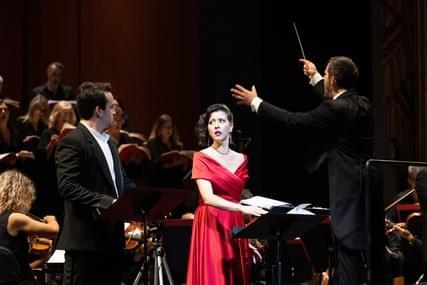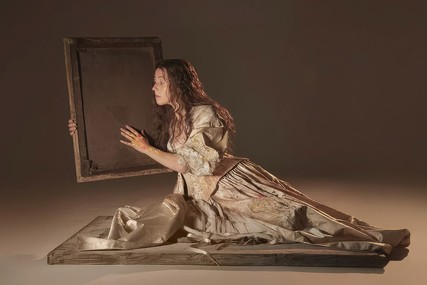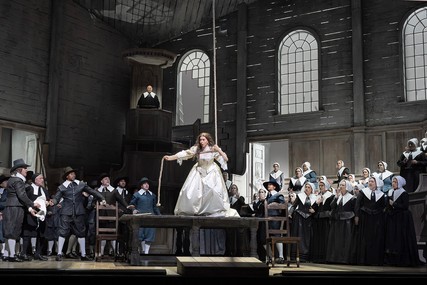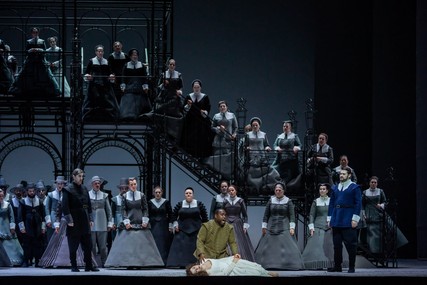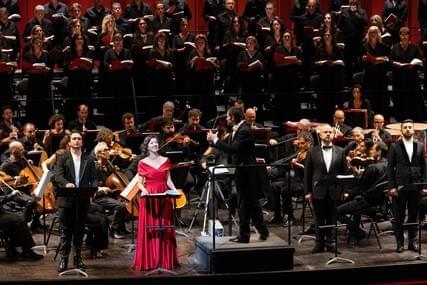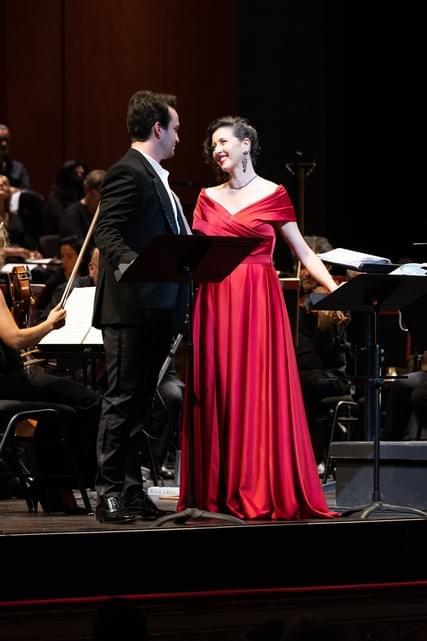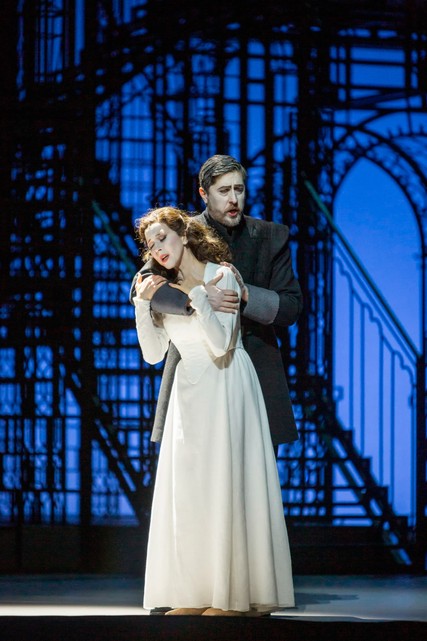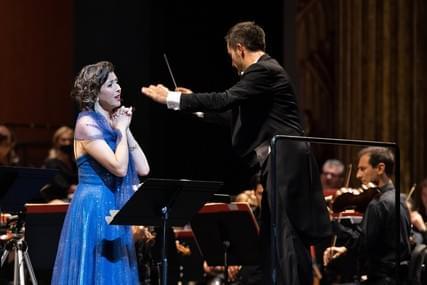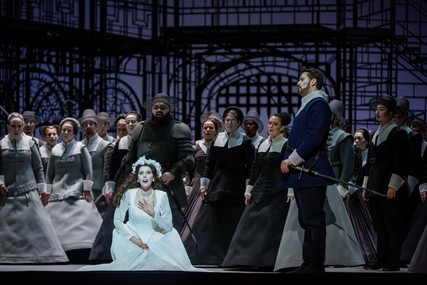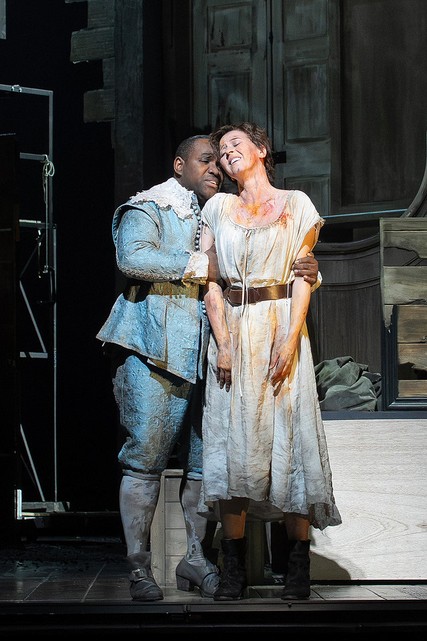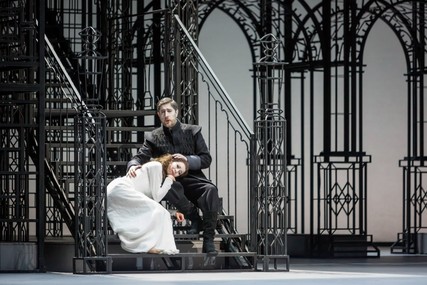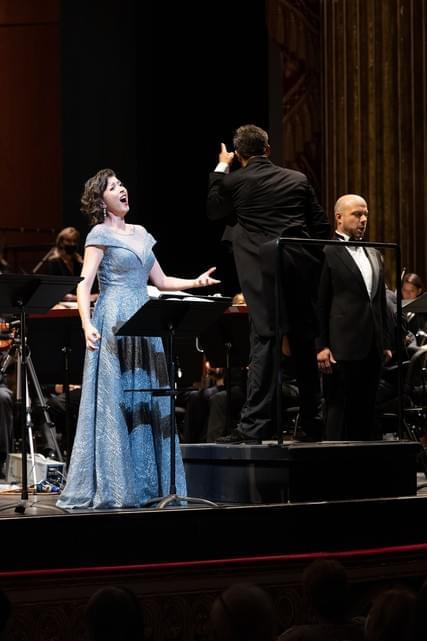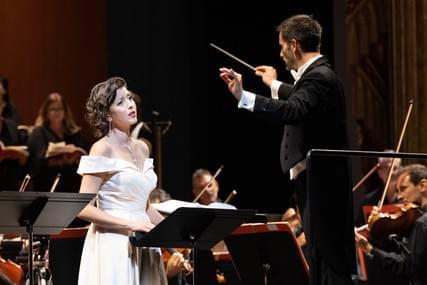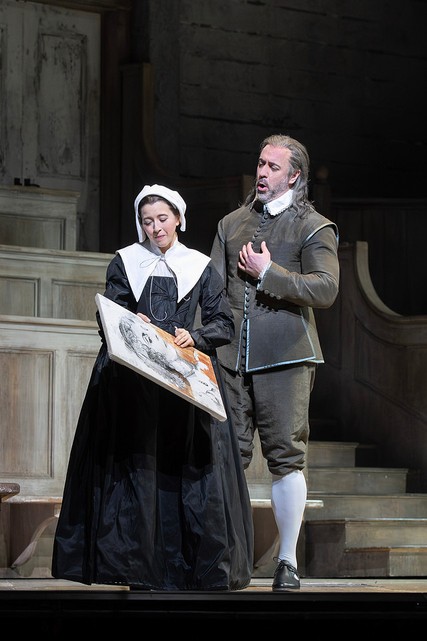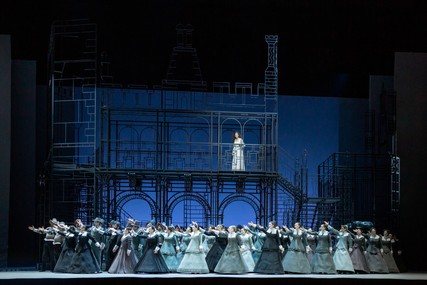Elvira in I Puritani
Lisette Oropesa's performances as Bellini's Elvira have been consistently celebrated across multiple reviews for her exceptional vocal prowess and compelling stage presence. Her interpretation is praised for its technical precision, particularly her ease with the demanding coloratura passages that define the role. Critics highlight her ability to maintain vocal elegance and accuracy, especially during the challenging "mad scene," which requires not only vocal dexterity but also emotional depth. Oropesa's voice is described as both brilliant and warm, allowing her to convey the complexity of Elvira's character with authenticity and grace.
Moreover, Oropesa's stage presence is frequently noted as a key element of her performance. Reviewers describe her as a natural and commanding presence on stage, capable of embodying the psychological nuances of Elvira's character. Her acting skills are commended for their intelligence and sincerity, as she brings a "troubling truth" to Elvira's descent into madness without resorting to melodramatic excess. This blend of vocal and dramatic skill results in a portrayal that is both technically accomplished and emotionally resonant, ensuring that her performance is not only engaging but also deeply moving.
Overall, Oropesa's interpretation of Elvira is notable for its combination of technical virtuosity, emotional depth, and stage charisma. Her ability to navigate the role's vocal challenges while delivering a nuanced and compelling portrayal of Elvira's psychological turmoil underscores her status as a leading soprano in the operatic world. This synthesis of skills has led critics to describe her performances as extraordinary and memorable, solidifying her reputation as an operatic diva of remarkable talent and dedication.
Lisette has been reviewed 42 times in this role.
Role Information
- Composer: Vincenzo Bellini
- Opera: I Puritani
- Performances: 21
- Reviews: 42
- Venues: 4
- Organizations: 4
- Years: 2022 - 2026
The evening is elevated to the stars by its exceptional vocal lineup. Lisette Oropesa steals the show. The high notes achieved naturally, the vocal runs flowing smoothly, the breath perfectly controlled, the pianissimos that effortlessly soar over the orchestra: the American soprano is simply staggering. In addition to her extraordinary vocal abilities, her stage performance is subtle, varied, and believable.…
The evening is elevated to the stars by its exceptional vocal lineup. Lisette Oropesa steals the show. The high notes achieved naturally, the vocal runs flowing smoothly, the breath perfectly controlled, the pianissimos that effortlessly soar over the orchestra: the American soprano is simply staggering. In addition to her extraordinary vocal abilities, her stage performance is subtle, varied, and believable. The scenes of madness lean less towards affected or strange dementia and more towards an emotional shock that is impossible to cope with, to grasp, and to comprehend.
— Forum Opera, February 2025
Oropesa’s tone and technique were ideal for the role. Elvira is a young woman, and that youth and inexperience explain her breakdown as well as can some burning inner psychological flaw. The litheness of her voice, the agility and fluttering vibrato, put the character’s heart on her sleeve, and were a tight fit for the music and drama. Oropesa didn’t…
Oropesa’s tone and technique were ideal for the role. Elvira is a young woman, and that youth and inexperience explain her breakdown as well as can some burning inner psychological flaw. The litheness of her voice, the agility and fluttering vibrato, put the character’s heart on her sleeve, and were a tight fit for the music and drama. Oropesa didn’t layer herself on Elvira, she sang from inside the character, and as dazzling as the vocalization often was, everything felt appropriate and organic. Her voice covered the full range of the part. While her tone in the high tessitura was occasionally inconsistent, this has a minor issue. The sheer athleticism of it was exciting to the audience, though the most impressive thing, constant throughout, was her artistry, the bravura part almost a side effect. The cascading representation of her downward mental spiral in “Oh, vieni al tempio” was effectively understated, and the sense in her singing in Acts II and III, before the reunion with Arturo, was an uncanny balance of a mind adrift shown through precise articulation and intonation.
— New York Classical Review, January 2026
Elvira Walton is embodied by Lisette Oropesa, who showcases a luminous voice with a rapid vibrato. Her coloratura, noted for its agility and precision, relies on bright and powerful high notes, always perfectly timbred. The soprano's theatrical commitment and expressive finesse allow her to portray a character of great complexity, whose madness recalls her striking interpretation of the title role…
Elvira Walton is embodied by Lisette Oropesa, who showcases a luminous voice with a rapid vibrato. Her coloratura, noted for its agility and precision, relies on bright and powerful high notes, always perfectly timbred. The soprano's theatrical commitment and expressive finesse allow her to portray a character of great complexity, whose madness recalls her striking interpretation of the title role in Lucia di Lammermoor at the Teatro Real in Madrid in 2018. She thus demonstrates the full extent of her bel canto art, combining technical virtuosity with dramatic depth.
— Olyrix, January 2026
An Exceptional Elvira On stage, Lisette Oropesa captivates from her entrance. Her luminous timbre, vocal flexibility, and mastery of legato serve the refined writing of Bellini to perfection. In "Son vergin vezzosa," she plays with a touching fragility tinged with premonition. Then, as Elvira descends into madness, the soprano impresses with the finesse of her dramatic interpretation. Her "O rendetemi…
An Exceptional Elvira On stage, Lisette Oropesa captivates from her entrance. Her luminous timbre, vocal flexibility, and mastery of legato serve the refined writing of Bellini to perfection. In "Son vergin vezzosa," she plays with a touching fragility tinged with premonition. Then, as Elvira descends into madness, the soprano impresses with the finesse of her dramatic interpretation. Her "O rendetemi la speme" is a peak of emotion, with suspended pianissimos and crystalline high notes that chill and move at the same time.
— Entrevu.fr, February 2025
Now it's Lisette Oropesa's turn. Even though she has been singing at the top of the world for a good decade, she hasn't lost any of the slimness, freshness, and youthful quality of her soprano voice, born for bel canto. In her case, technical assurance, which never abandons her even in the highest notes (which sometimes overpower choir and orchestra…
Now it's Lisette Oropesa's turn. Even though she has been singing at the top of the world for a good decade, she hasn't lost any of the slimness, freshness, and youthful quality of her soprano voice, born for bel canto. In her case, technical assurance, which never abandons her even in the highest notes (which sometimes overpower choir and orchestra masses), does not serve mere virtuosity but is always in the service of expression. This Elvira has everything in her voice from happiness to despair - when she has to deliver some stupidity from the direction, she at least manages it without embarrassment. Even as she stands in the last act with a short hairstyle and a kind of cheap summer dress (even though the costumes are more or less historical in nature), she still manages it without further embarrassment. There's no question, when it comes to opera acting, it's all about her, and when she sings, the opera lover cares more or less about the ambiance.
— Online Merker, January 2026
Front and center, as it should be, stands out Elvira, sung for the first time by the coloratura soprano born in the Jazz Delta, Lisette Oropesa. With a delivery that's flawless in intensity and pitch, speed, and precision across her entire range, Oropesa makes vibrato the very essence of her singing, literally metabolizing melody and technique to transform every potential…
Front and center, as it should be, stands out Elvira, sung for the first time by the coloratura soprano born in the Jazz Delta, Lisette Oropesa. With a delivery that's flawless in intensity and pitch, speed, and precision across her entire range, Oropesa makes vibrato the very essence of her singing, literally metabolizing melody and technique to transform every potential harshness in the high and very high registers into brilliantly luminous threads of pearlescent sounds. Her Elvira, with no fewer than four concert dress changes and a gestural credibility close to a staged version, soars high and effortlessly, navigating trills, scales, leaps, arpeggios, and the like with a naturalness and a rare beauty of timbre. But it's not just about skill on the musical staff. From her first entrance on stage beside her fatherly uncle Giorgio Valton, it's clear how well the character, created for Grisi and later tailored for Malibran for an unrealized Neapolitan premiere, fits perfectly within her repertoire, already conquered challenges, for the truth in her accents, the extreme fluidity of her transitions, and the dense, incredibly smooth brilliance of her stellar high notes. And if her polonaise "Son vergin vezzosa," sung in a white dress at the end of Act I, soon reveals itself to be a true delight for its rhythmic qualities, trills everywhere, and leaps at the peak of her range that are never harsh or randomly thrown, equally dazzling is her mad scene aria ("Qui la voce sua soave") filled with expressive expositions among flights, ecstasy, shifts, and pauses. Culminating in a sublime platinum B flat in the Allegro, after the fire of steep chromatic descents, in a powerful E flat in the extreme upper register.
— Conessi all'Opera, September 2022
As Elvira, Oropesa was able to overcome the challenges posed by the role from the very beginning, duetting with Gianluca Buratto's Giorgio in “Sai come arde in petto mio”, thanks to a gleaming, supple soprano, crystal-clear timbre, an effortless high register and a good command of thrills. She proved – contrary to many of her colleagues – that coloratura in…
As Elvira, Oropesa was able to overcome the challenges posed by the role from the very beginning, duetting with Gianluca Buratto's Giorgio in “Sai come arde in petto mio”, thanks to a gleaming, supple soprano, crystal-clear timbre, an effortless high register and a good command of thrills. She proved – contrary to many of her colleagues – that coloratura in operatic singing is not just an exhibition of vocal agility: it is the perceptible, theatrical evidence either of the anguish of the protagonist or of their outbursts of joy. And Oropesa moved masterfully through the score’s many demanding passages without losing dramatic focus.
“Qui la voce sua soave” was delivered with delicacy and an emotional charge of dramatic sense. In “Son vergin vezzosa”, Oropesa appeared in a stunning vocal form, with a sparkling sound and a precise staccato, with a charming tone across her whole range. She seemed at ease and confirmed herself as one of the best sopranos currently on the circuit.
— Bachtrack, September 2022
Lisette Oropesa, absolute queen Lisette Oropesa was the great winner of the evening and the true emotional core of the performance. Her Elvira was always sung with absolute control of the score, building a coherent, expressive, and vocally dazzling character. Her bel canto was expansive and meticulous, with lines of great beauty, round pianissimos sustained effortlessly, and a top-notch musicality.…
Lisette Oropesa, absolute queen Lisette Oropesa was the great winner of the evening and the true emotional core of the performance. Her Elvira was always sung with absolute control of the score, building a coherent, expressive, and vocally dazzling character. Her bel canto was expansive and meticulous, with lines of great beauty, round pianissimos sustained effortlessly, and a top-notch musicality. Oropesa's voice remains light but retains its timbral complexity, with brilliance in the top and depth in the lower register. The soprano once again confirmed that she is one of the leading specialists in the Bellini repertoire today, skillfully combining technical virtuosity with the most intimate expression.
— Opera World, January 2026
She goes in and out of sanity, from the end of Act I to almost the end of the opera, which is great for the opportunity to offer showpieces for Oropesa—she sounded particularly fine in the latter part of the work—and she took advantage of every one of them.
She goes in and out of sanity, from the end of Act I to almost the end of the opera, which is great for the opportunity to offer showpieces for Oropesa—she sounded particularly fine in the latter part of the work—and she took advantage of every one of them.
— Broadway World, January 2026
First and foremost, Lisette Oropesa must be mentioned, who has already interpreted the role in Paris and stepped in at short notice at the Winter Festival in Erl last year. Right from her first appearance with Elvira's uncle Giorgio, Oropesa shines with cleanly executed high notes and smooth lines. When she learns that her father has agreed to her marriage…
First and foremost, Lisette Oropesa must be mentioned, who has already interpreted the role in Paris and stepped in at short notice at the Winter Festival in Erl last year. Right from her first appearance with Elvira's uncle Giorgio, Oropesa shines with cleanly executed high notes and smooth lines. When she learns that her father has agreed to her marriage to Arturo, she jubilantly sings with perfectly executed coloratura in the highest tones. Impressive is also her portrayal of the scene where she succumbs to madness upon discovering her lover's supposed betrayal. Here, Oropesa once again vocally stirs the audience to enthusiastic applause. Another highlight is her grand mad scene in the second act. Here, her soprano sounds truly remote in its fragile heights. During the joyous reunion with her lover Arturo, she effortlessly reaches dizzying heights in the following duet.
— Online Musik Magazin, January 2026
Lisette Oropesa makes her absolute debut as Bellini's Elvira, fully rewarding the anticipation of hearing her - we add, at last! - at the Teatro San Carlo. From the duet between Elvira and Giorgio "Sai come arde in petto mio", Oropesa stands out for precision, technical skill, beautiful color, perfect vocal projection and dramatic intensity. Her technical prowess, the perfect…
Lisette Oropesa makes her absolute debut as Bellini's Elvira, fully rewarding the anticipation of hearing her - we add, at last! - at the Teatro San Carlo. From the duet between Elvira and Giorgio "Sai come arde in petto mio", Oropesa stands out for precision, technical skill, beautiful color, perfect vocal projection and dramatic intensity. Her technical prowess, the perfect mastery of coloratura, trills, and traditionally used E-flats and A-flats, the perfect support of the voice on the breath, and noble legato forge an elegant and composed Elvira, even within her tormented psychology. Lisette Oropesa allows us to hear the evolution of the protagonist's emotions, that long journey marked by joy, disappointment, despair, madness and finally, reclaimed happiness. The grand madness scene "Qui la voce sua soave" is wrapped in aristocratic composure: we are before a lunar Elvira rather than a distraught one. The frantic play of the coloratura in the subsequent cabaletta - all exceedingly well-calibrated, with astonishing precision - is then used to further highlight the protagonist's altered mental state. Indeed, the coloratura: in Lisette Oropesa's singing, it appears perfectly integrated with Bellini’s melodies, never as decorative trappings overlaid on the melodic design; instead, they become an inseparable part of the melos, so perfect is the mix, the spontaneity of execution, and the dramatic adherence. Oropesa’s interpretation of Bellini's Elvira, at her first meeting, is a compendium of vocal technique, an essay on bel canto aesthetics and an accurate and elegant interpretation of the complex Bellini character.
— L'ape musicale, September 2022
In her famed mad scene, Oropesa had to compete with the aforementioned chorus members’ exits and a huge set of distractions. But the soprano was up to the task. From her first, off-stage “O rendetemi la speme,” you could sense her longing for Arturo singing with her long legato lines. Then as she went on stage for “Qui la voce…
In her famed mad scene, Oropesa had to compete with the aforementioned chorus members’ exits and a huge set of distractions. But the soprano was up to the task. From her first, off-stage “O rendetemi la speme,” you could sense her longing for Arturo singing with her long legato lines. Then as she went on stage for “Qui la voce sua soave,” the soprano began her first verse with tender and smooth lines. The “Ah! tu sorridi e asciughi il pianto!,” interlude maintained a delicacy that soon turned to darker tones, especially in her lower notes. In the repeat of the A melody, Oropesa sang with slight accents, particularly on each repeat of “O lasciate, lasciatemi morir,” giving the line a little more aggressiveness. She pushed the melody forward, helping express the character’s ever-growing desperation. In the subsequent, “Vien diletto e in ciel la luna,” Oropesa once again displayed prowess in her coloratura each time rising to exquisite high notes and impeccable fioritura. Her E-Flat that capped off the mad scene resonated with striking power.
— OperaWire, January 2026
Lisette Oropesa: La Diva!The cast was led by Lisette Oropesa, who made her debut in this role in a staged production during this run. Her performance was nothing short of extraordinary, excelling both musically and dramatically. Her bright, silvery soprano navigated the daunting coloratura passages Bellini composed for his heroine with remarkable ease. She delivered flawless, precise trills, thrilling coloratura,…
Lisette Oropesa: La Diva!
The cast was led by Lisette Oropesa, who made her debut in this role in a staged production during this run. Her performance was nothing short of extraordinary, excelling both musically and dramatically. Her bright, silvery soprano navigated the daunting coloratura passages Bellini composed for his heroine with remarkable ease. She delivered flawless, precise trills, thrilling coloratura, and stunning high notes that sparkled with brilliance.In the upper register, her voice had a fluttering quality that added an emotional intensity to every phrase, as though she could convey the palpitations of a racing heart. In the more lyrical sections, her seamless legato and delicate pianissimi were deeply moving. A resounding success!
The evening was a resounding triumph, culminating in a standing ovation for Lisette Oropesa.
— OperaWire, February 2025
In the role of Elvira, Lisette Oropea is stunningly natural; her brilliant voice, while not lacking in warmth, coupled with a remarkable stage presence, never sacrifices a consistently clear diction, even in the most virtuosic passages (impressive variation on "Vieni al tempio!"). As for her scene of delirium, it is nothing short of iconic.
In the role of Elvira, Lisette Oropea is stunningly natural; her brilliant voice, while not lacking in warmth, coupled with a remarkable stage presence, never sacrifices a consistently clear diction, even in the most virtuosic passages (impressive variation on "Vieni al tempio!"). As for her scene of delirium, it is nothing short of iconic.
— Classique News, February 2025
But the vocal success of this production rests on Oropesa and Brownlee. Oropesa not only negotiates Elvira’s many coloratura runs with stunning ease, but captures the character’s up-and-down emotional states vividly enough to almost make the libretto’s dime-store psychology work.
But the vocal success of this production rests on Oropesa and Brownlee. Oropesa not only negotiates Elvira’s many coloratura runs with stunning ease, but captures the character’s up-and-down emotional states vividly enough to almost make the libretto’s dime-store psychology work.
— Theater Mania, January 2026
Lisette Oropesa's interpretation of Elvira is dominated by the impeccable accuracy of her coloratura, elegance in register changes, and a stunning stage presence. However, it is an understatement to say that Act II spares her character little, psychologically tortured by Arturo's betrayal, navigating between madness and despair: Lisette Oropesa steers the ship with an agility and naturalness that are all…
Lisette Oropesa's interpretation of Elvira is dominated by the impeccable accuracy of her coloratura, elegance in register changes, and a stunning stage presence. However, it is an understatement to say that Act II spares her character little, psychologically tortured by Arturo's betrayal, navigating between madness and despair: Lisette Oropesa steers the ship with an agility and naturalness that are all the more disarming as she infuses the bel canto with an additional dimension of tragedienne, reserved for the greatest. Breaking free from the simple and caricatural display of virtuosity, the soprano lends her Elvira, through her dramatic depth, the qualities of a Violetta.
— Bachtrack, February 2025
Lisette Oropesa introduces us to the world of Elvira, a whirlpool of suffering with a few rare moments of clarity, where madness allows for fleeting moments of joy. The young woman rejects the exaltation of homeland and war, becoming misophonic in the face of any military composition.
Lisette Oropesa introduces us to the world of Elvira, a whirlpool of suffering with a few rare moments of clarity, where madness allows for fleeting moments of joy. The young woman rejects the exaltation of homeland and war, becoming misophonic in the face of any military composition.
— FranceTV Info, February 2025
Funambulist and ghostly, Lisette Oropesa delivers a memorable performance; a accomplished virtuoso with a supple and undulating voice (in the Polonaise), her character combines beauty of line and roundness of timbre (in the Folie) with a highly developed bel canto grammar. This athlete, a fan of running, is in perpetual movement here, breathing music with grace and finding in this…
Funambulist and ghostly, Lisette Oropesa delivers a memorable performance; a accomplished virtuoso with a supple and undulating voice (in the Polonaise), her character combines beauty of line and roundness of timbre (in the Folie) with a highly developed bel canto grammar. This athlete, a fan of running, is in perpetual movement here, breathing music with grace and finding in this score the key to a moving and highly sought-after interpretation.
— Concert Classic, February 2025
What can be said about the duo Lisette Oropesa/Lawrence Brownlee? Here we reach peaks of vocal technique, of which we also admire the risk-taking: in her quest for nuances, the American soprano pushes her voice to its limit and does not settle for simply ensuring her high notes.
What can be said about the duo Lisette Oropesa/Lawrence Brownlee? Here we reach peaks of vocal technique, of which we also admire the risk-taking: in her quest for nuances, the American soprano pushes her voice to its limit and does not settle for simply ensuring her high notes.
— Classy Keo, January 2026
As Elvira, Lisette Oropesa spun out Bellini’s melodies and flowing lines with the utmost care. ‘Son vergin vezzosa’ was a joyous expression of love captured in fleet, bubbling coloratura and luminous high notes. When Elvira gave voice to her shattered mental state in ‘Qui la voce … Vien, diletto’, Oropesa employed those same vocal skills and musicality to express total…
As Elvira, Lisette Oropesa spun out Bellini’s melodies and flowing lines with the utmost care. ‘Son vergin vezzosa’ was a joyous expression of love captured in fleet, bubbling coloratura and luminous high notes. When Elvira gave voice to her shattered mental state in ‘Qui la voce … Vien, diletto’, Oropesa employed those same vocal skills and musicality to express total despair.
— Seen and Heard International, January 2026
This secret beauty is found in Lisette Oropesa, a striking embodiment of truth. No note, no vocalise has any other purpose than the revelation of an inner world in constant metamorphosis. From her first wanderings, among the scrap metal harrows on a turntable that serve as a set, her fluid playing suggests tragedy. A radiant presence, an exemplary bel canto…
This secret beauty is found in Lisette Oropesa, a striking embodiment of truth. No note, no vocalise has any other purpose than the revelation of an inner world in constant metamorphosis. From her first wanderings, among the scrap metal harrows on a turntable that serve as a set, her fluid playing suggests tragedy. A radiant presence, an exemplary bel canto singer (admirable "messa di voce"), her full and fruity vocal quality captivates and moves from the first to the last measure.
— Crescendo Magazine, February 2025
Lisette Oropesa’s Elvira was just about perfect – dramatically apt from innocence to madness and back but with an attention to text and dynamics that made the opera come to life as something other than a vocal showcase. The role requires agility, even emission, a handsome tone, ease in coloratura and staying power. All were in evidence and the many…
Lisette Oropesa’s Elvira was just about perfect – dramatically apt from innocence to madness and back but with an attention to text and dynamics that made the opera come to life as something other than a vocal showcase. The role requires agility, even emission, a handsome tone, ease in coloratura and staying power. All were in evidence and the many exposed high notes were not merely ornamental, they were organic.
— Opera Now, January 2026
Although Elvira is unsettled in mind for a good portion of the opera, Lisette Oropesa sustains the utmost musical presence and poise in her performance, above all in the long ‘mad scene’ of Act Two. Her vocal line is superbly even throughout, and she evinces a Callas-like ability to express vulnerability and fear within the timbral richness of her singing.
Although Elvira is unsettled in mind for a good portion of the opera, Lisette Oropesa sustains the utmost musical presence and poise in her performance, above all in the long ‘mad scene’ of Act Two. Her vocal line is superbly even throughout, and she evinces a Callas-like ability to express vulnerability and fear within the timbral richness of her singing.
— Classical Source, March 2025
On the shields, two of the main performers. Lisette Oropesa, who will soon perform the role in Paris, made a sensation with her singing, which, without dwelling too much on high notes, messa di voce, and added ornamentations, aimed primarily at embodying a real character. In such a high-level performance, she deserves recognition for a scene of madness in the…
On the shields, two of the main performers. Lisette Oropesa, who will soon perform the role in Paris, made a sensation with her singing, which, without dwelling too much on high notes, messa di voce, and added ornamentations, aimed primarily at embodying a real character. In such a high-level performance, she deserves recognition for a scene of madness in the second act, memorable even for its gestures, not conditioned for once by the score on the music stand. It's a pity that the finale written for Malibran was not performed, but the polonaise, the duets with the bass and tenor, and her "Ah vieni al tempio" (one of those moments where Bellini's music touches the sky and hearts) will be remembered and rightfully so.
— Conessi all'Opera, January 2025
Amidst the applause, it's Lisette Oropesa who receives all the votes: from the very first phrases (so difficult), she impresses with a bright and colorful voice, with a rich middle range, capable of vocalizing with precision and reaching powerful high notes (she even dares a killer variation on "Vieni al tempio!").
Amidst the applause, it's Lisette Oropesa who receives all the votes: from the very first phrases (so difficult), she impresses with a bright and colorful voice, with a rich middle range, capable of vocalizing with precision and reaching powerful high notes (she even dares a killer variation on "Vieni al tempio!").
— Olyrix, February 2025
Thus, no bizarre stage antics, but a lot of anticipation especially for the star of the evening, Lisette Oropesa, in a double debut, both in front of the San Carlo audience (where she had already appeared for a multi-voice recital streamed at the end of 2020) and in the role of Elvira. The soprano did not disappoint; hers was a…
Thus, no bizarre stage antics, but a lot of anticipation especially for the star of the evening, Lisette Oropesa, in a double debut, both in front of the San Carlo audience (where she had already appeared for a multi-voice recital streamed at the end of 2020) and in the role of Elvira. The soprano did not disappoint; hers was a fragile Elvira, expressed with a voice that was delicate yet assertive and technically solid, adorned with a velvety timbre lightly flecked. Moreover, she proved to be well “in style” with bel canto aesthetics, using virtuosities for expressive purposes and displaying exceptionally clear diction that allowed for the right accents. She was also the one who, more than anyone else in this concert performance, tried with gestures, looks, some movements, to convey the dramatic idea of the character. Thus, an excellent performance that peaked in the great madness scene, conducted with pathetic accents and excellent agility control, with the variations well conducted but measured in the recapitulation of the cabaletta.
— Opera Click, September 2022
Oropesa’s has an outward state that swerves from ecstasy to insanity, but with a firmly held core. Even at her most desperate, she manages to retain control, especially over her voice. This holds true regardless of whether she was primly composed in her Puritan garb or refusing for months to take off her wedding dress, a Miss Havisham in the…
Oropesa’s has an outward state that swerves from ecstasy to insanity, but with a firmly held core. Even at her most desperate, she manages to retain control, especially over her voice. This holds true regardless of whether she was primly composed in her Puritan garb or refusing for months to take off her wedding dress, a Miss Havisham in the making. Oropesa needed no time to warm up on Wednesday, entering with confidence, precision and agility. Her passaggio, the sometimes perilous transition between vocal registers, was smoothly imperceptible. In one phrase that ended with a chromatic descent, she so clearly articulated each pitch down the scale, it was like listening to someone run their fingers across the keys of a piano.
— New York Times, January 2026
Yes, indeed, the depth of the cast and the exceptionally high level of the protagonist Lisette Oropesa's performance can only confirm the triumph of this production. Despite being an established and celebrated bel canto interpreter, the Cuban-American soprano began to delve into the Bellini repertoire relatively recently (debuting as Giulietta and, precisely, as Elvira in 2022). Perhaps, it is for…
Yes, indeed, the depth of the cast and the exceptionally high level of the protagonist Lisette Oropesa's performance can only confirm the triumph of this production. Despite being an established and celebrated bel canto interpreter, the Cuban-American soprano began to delve into the Bellini repertoire relatively recently (debuting as Giulietta and, precisely, as Elvira in 2022). Perhaps, it is for this reason that the Elvira who appeared on the stage of the Bastille, more than a charming maiden, is a fully fleshed-out character who transcends the narrow confines imposed by the libretto's dramaturgy, and in whose tormented psychology we believe we can occasionally glimpse, as if subtly outlined, the face of Lucia Ashton (not by chance, one of her signature roles). Therefore, the prodigious ease in executing the highly virtuosic bel canto coloratura (which all hit the mark) never turns into mere "bravura" ornamentations for their own sake; instead, they are supported by a robust dramatic accentuation, especially in the lower register, where the voice displays a beautiful bronzed color.
— Conessi all'Opera, February 2025
Oropesa’s limpid soprano is pushed to its limits in the heaviest passages of the role but the rest gives her ample opportunity to show off her dazzling coloratura and fluent trill. Where she really shines is in the long, yearning melodies that are Bellini’s hallmark.
Oropesa’s limpid soprano is pushed to its limits in the heaviest passages of the role but the rest gives her ample opportunity to show off her dazzling coloratura and fluent trill. Where she really shines is in the long, yearning melodies that are Bellini’s hallmark.
— The Times, January 2026
Lisette Oropesa is a radiant Elvira, with exemplary agility and musicality, effortlessly delivering trills and nuances with admirable textual intelligence. Even adorned with an absurd idea - frantically drawing portraits during her mad scenes - she still manages to move the audience.
Lisette Oropesa is a radiant Elvira, with exemplary agility and musicality, effortlessly delivering trills and nuances with admirable textual intelligence. Even adorned with an absurd idea - frantically drawing portraits during her mad scenes - she still manages to move the audience.
— Opera Magazine, January 2026
Regarding vocal soloists, Lisette Oropesa is an ideal match for the role of Bellini's Elvira, both in terms of voice type and stage presence. Her ease with coloratura, her acting intelligence, her beautiful singing line, and her remarkable intelligibility are assets that the soprano knows how to use to create a character that is tender but not naive, mad but…
Regarding vocal soloists, Lisette Oropesa is an ideal match for the role of Bellini's Elvira, both in terms of voice type and stage presence. Her ease with coloratura, her acting intelligence, her beautiful singing line, and her remarkable intelligibility are assets that the soprano knows how to use to create a character that is tender but not naive, mad but not brutal. Highly believable.
— Mundo Classico, March 2025
In the demanding role of the heroine Elvira – torn between her love for the Royalist Arturo and her arranged marriage to Riccardo, a Puritan colonel in Cromwell’s army – is soprano Lisette Oropesa. Enduring the torments of love and her perceived betrayal by Arturo, Elvira is mentally unhinged for much of the opera, but Oropesa’s singing remained poised and…
In the demanding role of the heroine Elvira – torn between her love for the Royalist Arturo and her arranged marriage to Riccardo, a Puritan colonel in Cromwell’s army – is soprano Lisette Oropesa. Enduring the torments of love and her perceived betrayal by Arturo, Elvira is mentally unhinged for much of the opera, but Oropesa’s singing remained poised and even throughout. This was especially so in Act 2’s long, technically demanding “mad scene”. The main aria, “Qui la voce sua soave” – in which she alternates between moments of pain and playfulness as she hallucinates about her beloved Arturo’s presence – was a superb display of vocal virtuosity.
— Bachtrack, January 2026
After the intermission, Oropesa appears not only in a flowing black gown as an expression of Elvira's mental derangement but also performs the role largely from memory. She convincingly portrays the grand madness scene in the second act. Her soprano voice, in its fragile heights, seems almost ethereal. Oropesa truly stages her entrance, leaning on the music stands, all of…
After the intermission, Oropesa appears not only in a flowing black gown as an expression of Elvira's mental derangement but also performs the role largely from memory. She convincingly portrays the grand madness scene in the second act. Her soprano voice, in its fragile heights, seems almost ethereal. Oropesa truly stages her entrance, leaning on the music stands, all of which she knocks down to add more expression to her performance.
— Online Musik Magazin, January 2025
The most applauded of all is Lisette Oropesa, debuting in the role of Elvira: the agility she displays in the bravura passages is remarkable, the sparkle of her voice does not sacrifice the elegance of the phrase; it's on this exclusive territory that the American soprano builds her performance, leaving to future endeavours the possibility to deeply characterize a character…
The most applauded of all is Lisette Oropesa, debuting in the role of Elvira: the agility she displays in the bravura passages is remarkable, the sparkle of her voice does not sacrifice the elegance of the phrase; it's on this exclusive territory that the American soprano builds her performance, leaving to future endeavours the possibility to deeply characterize a character who, over the course of three acts, changes skin several times.
— Il Mattino Napoli, September 2022
In great form, Lisette Oropesa gives Elvira an even more accomplished interpretation than in Paris last season. "Son vergin vezzosa" highlights the fluidity of her vocalizations and the precision of her impeccable trills. "O rendetemi la speme" is sung with an ethereal timbre and infinite delicacy, and finally, the cabaletta "Vien diletto" exalts her mastery of coloratura, especially in the…
In great form, Lisette Oropesa gives Elvira an even more accomplished interpretation than in Paris last season. "Son vergin vezzosa" highlights the fluidity of her vocalizations and the precision of her impeccable trills. "O rendetemi la speme" is sung with an ethereal timbre and infinite delicacy, and finally, the cabaletta "Vien diletto" exalts her mastery of coloratura, especially in the reprisal with ornamentations up to the high Eb which earned her a well-deserved ovation.
— Forum Opera, January 2026
this is very much Lisette Oropesa’s show. Her Elvira has abundant charm and she uses vocal ornaments in an almost gestural manner that is powerfully expressive. Her mad scene in Act II was riveting, despite the dizzying distractions.
this is very much Lisette Oropesa’s show. Her Elvira has abundant charm and she uses vocal ornaments in an almost gestural manner that is powerfully expressive. Her mad scene in Act II was riveting, despite the dizzying distractions.
— Financial Times, January 2026
Lisette Oropesa in the role of Elvira. You are breathless, fortunately she is not: the voice is charming, but your expert eye sees that she starts with a "check" in a vocalise of formidable difficulty, and you feel that she is testing the ground like a seasoned athlete. Also, read the full review of the evening on Ôlyrix. You know…
Lisette Oropesa in the role of Elvira. You are breathless, fortunately she is not: the voice is charming, but your expert eye sees that she starts with a "check" in a vocalise of formidable difficulty, and you feel that she is testing the ground like a seasoned athlete. Also, read the full review of the evening on Ôlyrix. You know that she knows the path, that she assesses how far her strengths can take her tonight. Ductile, her voice is: the sound is round, the texture silky, the line flexible. The support today responds well, and you feel the artist becoming more and more involved in the role, with confidence, opening her vigilance to the pleasure of the game and music. In you, a similar pleasure, vicariously, empathetically, makes you breathe with her, close your eyes when the sound is too beautiful, sigh when it is sad... you form this double and strange body that shares a knowledge she brings to the stage with a boldness you dared not have. You are moved because you would have wanted to, or maybe not, but if she wanted, you are happy because she achieves it, and everything tonight is a great lesson in singing, stage, and art.
— Classy Keo, February 2025
The role of Elvira is daunting in its vocal demands, and, in this production, she is onstage for almost the entire evening. Luckily, Oropesa was up to the challenge, whirling around the scaffolding in the throes of increasing mania. Her vocal stamina, too, was admirable, as she handled the intricacies of the coloratura with verve and let loose some resounding…
The role of Elvira is daunting in its vocal demands, and, in this production, she is onstage for almost the entire evening. Luckily, Oropesa was up to the challenge, whirling around the scaffolding in the throes of increasing mania. Her vocal stamina, too, was admirable, as she handled the intricacies of the coloratura with verve and let loose some resounding acuti, even in the final act. Oropesa’s solid technique—proper vowel alignment and abundant appoggio, chiefly—has afforded her the ability to flesh out a myriad of hues across her register.
— Parterre, February 2025
The music, however, was top-notch. Ms. Oropesa’s limpid, flexible soprano brought a heart-tugging vulnerability to Elvira, and her pealing coloratura was both accurate and expressive. She was especially mesmerizing in her extended Act 2 mad scene—“Qui la voce” and “Vien diletto.”
The music, however, was top-notch. Ms. Oropesa’s limpid, flexible soprano brought a heart-tugging vulnerability to Elvira, and her pealing coloratura was both accurate and expressive. She was especially mesmerizing in her extended Act 2 mad scene—“Qui la voce” and “Vien diletto.”
— Wall Street Journal, January 2026
Starting with Lisette Oropesa. An absolute diva, truly, who takes hold of this role with unwavering commitment, a troubling truth, carrying Elvira to the edges of a madness that rejects the spectacular, expressionism, or histrionics, to be only in the pure expressiveness of her singing, stripped of all affectation, and which petrifies you with what she reveals and conceals of…
Starting with Lisette Oropesa. An absolute diva, truly, who takes hold of this role with unwavering commitment, a troubling truth, carrying Elvira to the edges of a madness that rejects the spectacular, expressionism, or histrionics, to be only in the pure expressiveness of her singing, stripped of all affectation, and which petrifies you with what she reveals and conceals of unconscious suffering. The impact is significant, the emotion in the hall palpable. And the soprano's vocal abilities astonish. Ease in the airy high notes as well as effortlessly unfurled vocalizations, finely spun pianissimos, controlled breath. With each of her appearances, as she sinks further into this nightmare, increasingly absent from herself, the suspended audience seemed to hold its breath.
— Un Fauteuil Pour l'Orchestre, February 2025
The team of singers is strongly balanced with veteran theatre voices and the debut of Lisette Oropesa. Oropesa displays quality, her voice full of strength and vulnerability, expressed through a fabulous, rich timbre, filled with darkness and melancholy, over a backdrop of strings and brass, without a single flaw, without any failed expressive or dynamic intention – a splendid "morrò…
The team of singers is strongly balanced with veteran theatre voices and the debut of Lisette Oropesa. Oropesa displays quality, her voice full of strength and vulnerability, expressed through a fabulous, rich timbre, filled with darkness and melancholy, over a backdrop of strings and brass, without a single flaw, without any failed expressive or dynamic intention – a splendid "morrò d’amor" – she performs the role masterfully.
— Giornale della Musica, September 2022
Her return in Act II with the aria "O rendetemi la speme" confirms her extraordinary embodiment of the role and the sensitivity with which she delivers these magnificent arias, relying on her velvety middle range, providing sumptuous high piani filés. She then boldly performs "Vien, diletto, è in ciel la luna!" in connection with the conductor who plays with rhythms…
Her return in Act II with the aria "O rendetemi la speme" confirms her extraordinary embodiment of the role and the sensitivity with which she delivers these magnificent arias, relying on her velvety middle range, providing sumptuous high piani filés. She then boldly performs "Vien, diletto, è in ciel la luna!" in connection with the conductor who plays with rhythms to make the aria something other than simply a virtuosic passage. Her final interventions finally crown the journey of this heroine whom she has brought safely home despite the obstacles, and has ultimately transcended, by combining virtuosity and sensitivity, and paying tribute to the challenging, yet beautiful, bel canto style of Bellini.
— Cult.news, February 2025
Famous Interpreters
The role of Elvira in Vincenzo Bellini's "I Puritani" was first performed by soprano Giulia Grisi at the opera's premiere on January 24, 1835, at the Théâtre-Italien in Paris. Giulia Grisi, born on May 22, 1811, in Milan, was a prominent Italian soprano of the 19th century. She was known for her performances in the bel canto repertoire and was part of the original cast of several important operas. Besides Elvira, Grisi is well-documented for her roles as Norina in Donizetti's "Don Pasquale" and Adalgisa in Bellini's "Norma," among others.
Among other notable interpreters of Elvira, Maria Callas is well-documented, with her active period primarily in the 1940s to the 1960s. Callas's performances of "I Puritani" include a notable recording from 1953, which remains a significant reference for the role. Another important interpreter was Joan Sutherland, active from the 1950s to the 1980s. Sutherland's portrayal of Elvira is documented in several recordings, including a well-known 1963 studio recording. Both Callas and Sutherland are recognized for their contributions to the operatic world, with extensive discographies and numerous performances in major opera houses globally. Documentation confirms their status as leading figures in the bel canto revival of the 20th century.
About the Composer
Vincenzo Bellini, a quintessential figure of the bel canto era, was renowned for his gift of crafting long, flowing melodic lines. Born in Catania, Sicily, in 1801, Bellini's operas are celebrated for their emotional depth and lyrical beauty. "I Puritani," his final opera, premiered in Paris in 1835, marking a significant point in his career as he sought to establish himself in the French capital's vibrant music scene. This work stands out for its dramatic intensity and the innovative way it combines the romantic fervor of its story—a tale of love and political conflict set during the English Civil War—with Bellini's signature melodic style. The opera is particularly notable for its demanding vocal lines, which showcase Bellini's masterful approach to vocal writing. He tailored these roles to the strengths of his singers, creating dazzling arias and ensembles that require both technical prowess and expressive nuance, ensuring "I Puritani" remains a beloved staple in the operatic repertoire to this day.
Performance Photos
- Sept. 7, 2022Luciano Romano
- Sept. 7, 2022Luciano Romano
- Feb. 3, 2025Sébastien Mathé / OnP
- Feb. 3, 2025Sébastien Mathé / OnP
- Feb. 3, 2025Sébastien Mathé / OnP
- Feb. 3, 2025Sébastien Mathé / OnP
- Feb. 3, 2025Sébastien Mathé / OnP
- Sept. 7, 2022Luciano Romano
- Dec. 31, 2025Paola Kudacki
- Feb. 3, 2025Sébastien Mathé / OnP
- Sept. 7, 2022Luciano Romano
- Sept. 7, 2022Luciano Romano
- Feb. 3, 2025Sébastien Mathé / OnP
- Sept. 7, 2022Luciano Romano
- Feb. 3, 2025Sébastien Mathé / OnP
- Feb. 3, 2025Sébastien Mathé / OnP
- Sept. 7, 2022Luciano Romano
- Sept. 7, 2022Luciano Romano
- Sept. 7, 2022Luciano Romano
- Feb. 3, 2025Sébastien Mathé / OnP
- Sept. 7, 2022Luciano Romano
- Feb. 3, 2025Sébastien Mathé / OnP
Performance History
Lisette has performed Elvira 21 times.

